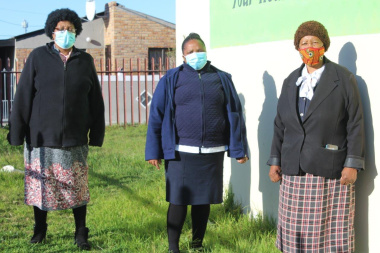
News
Care workers face more than just COVID-19
Community healthcare workers play a significant role in bringing healthcare services to communities across the Western Cape. They are assigned to a specific area within a community and go from door-to-door to ensure they reach as many people in their assigned area as possible.
One such example is when the Western Cape Government Health made 36 caregivers and seven Professional Nurses available to SACLA for COVID-19 screening and testing. South African Christian Leadership Assembly (SACLA) is a non-profit organisation, contracted by the Department and provides home-based care in and around Khayelitsha. They do door-to-door community services and deliver chronic medication to patients. They also refer patients to social workers, trace and record people with lifestyle illnesses, do health talks and community outreaches. Referrals from facilities and hospitals go to SACLA and the care workers also do follow-ups. Western Cape Government Health also works closely with and provides assistance to other community organisations, such as Philani and St Luke’s Hospice.
The community healthcare workers, also referred to as ‘foot soldiers’, have recently added TB screening to their outreaches done for COVID-19. By walking from door-to-door in the community, these healthcare workers get to know their clients well, and have a good understanding of the challenges that our communities face every day. By knowing their clients and communities these foot soldiers play a critical role in identifying illness early and helping people to manage their underlying conditions.
Speaking about their COVID-19 outreach work, SACLA healthcare worker Ms Nomisa Lawana explains that some of the major difficulties they have recently experienced on the ground include the stigma displayed by communities due to a lack of understanding of COVID-19. Nomisa says people are not willing to let community healthcare workers screen them by asking them questions and they don’t want to go for COVID-19 testing because of the stigma attached to being diagnosed with COVID-19. She adds that many people are aware of the precautions they should take, but that they choose not to adhere to it. “Some people just do not take this situation seriously enough and don’t care, others even say they will not die alone and they walk around without masks,” explains Nomisa.
Ms Anna Genu, a manager from SACLA, agrees. “Ignorance is the biggest issue that we face. Our people have heard the messages from the health department and know the facts, but they do not seem to care.”
“People are never really afraid of what they have not experienced personally,” adds Ms Nokuthula Tyali, a Staff Nurse working for SACLA.
Besides facing stigma and the dangers of COVID-19, community healthcare workers often get robbed on the streets while they try to perform their duties in the communities. They risk their lives every day to check in on their patients and to provide them with crucial basic healthcare services. “Even travelling in numbers does not always help as we have to go to different places around these areas,” explains Nokuthula.
The community healthcare workers explain that COVID-19 has created an opportunity when they must go into households to check for lifestyle illnesses and also deal with wounds as required. “The Health Department has helped us a lot by providing us with additional caregivers and Professional Nurses,” says Anna.
Nomisa explains that their primary duty is to inform and educate people about taking care of themselves and prioritising their health so that they won’t get sick and need to go to hospital and health facilities. She says that there is a lot of work to be done for our communities to combat non-adherence to medical advice and safety precautions, but that she leads a very dedicated team who shows courage and determination in their work. “We see that more people are beginning to wear masks as compared to the beginning of the lockdown, so we are seeing behavior change. We hope that by setting the example of hand hygiene and wearing our masks, we will also lead by example and not just by words.”
Sithembiso Magubane
Principal Communications Officer: Khayelitsha & Eastern Substructure
Western Cape Government: Health
Tel: 021 360 4702
E-mail: sithembiso.magubane@westerncape.gov.za
Website: www.westerncape.gov.za


